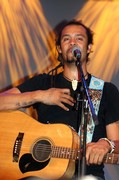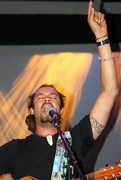|
Taken from The Orion Online (November 16, 2005)
Musician's documentary spotlights Iraqi, Palestinian life
by Nick Franklin - Staff Writer

The Orion : LAURA FITZPATRICK
Michael Franti shows his
documentary "I Know I'm
Not Alone" about his travels
to Iraq and Israel to a
packed house Sunday night i
n the BMU Auditorium. |
Michael Franti is a fascinating man. He plays guitar, he sings and he travels around the world to play guitar and sing. Plus, he has dreadlocks.
He knows this, so when the Spearhead frontman swung by the Bell Memorial Union Auditorium on Sunday night for an advance screening of his first documentary, "I Know I Am Not Alone," he made it no secret to his audience.
After he opened the show by casually sharing with the audience every detail of his day -- right down to his red-eye flight and the burrito he had for lunch, which must have been noteworthy because they were brief vacations from constant toiling to save the world -- the outspoken activist-musician cut to the chase with some info about his foray into filmmaking.
During the Iraq War and its aftermath, Franti noticed a disturbing trend in American media: Reporters never had anything to say about the human impact of war. They were only concerned with covering the economic losses.
After gathering some talented folks from the film industry, Franti set out for Iraq and for Palestinian areas of Israel; one nation occupied for a couple of years, and the other for generations. As the film begins with Franti landing in Baghdad, viewers immediately see the disaster that is Iraq.
As Franti tours around Baghdad with a group of native translators and cameramen, viewers see how a lack of infrastructure has left Iraq in tatters.
On top of widespread unemployment and terror in the streets, basic resources such as clean water and electricity are scarce, while basic rights such as walking around the city are restricted by curfew.
Guitarists from the Baghdad heavy metal band The Black Scorpion strip the useless telephone wires on the streets and shave them down to use as guitar strings. Like antibiotics, guitar strings are one of the many things unavailable in the city.

The Orion : LAURA FITZPATRICK
Michael Franti shows the
audience good vibes during
his acoustic show Sunday
night after the screening of
his new documentary. |
A camera swoops down to the floor as a band member points out the small generator that allows the band to amplify its instruments, one of the thousands that belch fumes to power the city.
Lead singer Walid later says that he would give anything just to enjoy the pleasures Americans enjoy, even to have a moment to sit by a lake and breathe the fresh air, rather than the cloying gasoline air of Baghdad.
The film loses a bit of focus as some interviewees discuss the fear and terror of life under Saddam Hussein while others bemoan life under the Americans. Viewers are left with no clear idea about what Iraqis feel about the occupation, aside from the fact that they want to feel safe on their streets and that they want access to medicine and power.
But more than anything, Franti's self-adoration practically pummels the film off track at times. After powerful images such as an interview with a soldier interrupted by an explosion, bizarre editing takes us to one of the countless scenes of Franti strolling around singing his "Habibi" song for natives.
After so many of these scenes, which eventually are accompanied by photo and video montages of children smiling, the viewer has to question Franti's motives. Does he really want to give voice to occupied Iraq? Or does he simply want self-congratulatory footage to remind viewers that Michael Franti flies to the Middle East to play for natives and soldiers, as if USO rejected him.
In the end, it feels like the latter, as too much emphasis is placed on his music, whether being mixed in with the film or played on camera. But luckily Franti's visit to Israel is the saving grace of the film.
Franti's use of hard facts and intrepid interviews turned the film into what it should have been: a documentary about life under rule, rather than a documentary about singing for the oppressed.
A concise visual representation of the Israelis' occupation of territories beyond the Green Line established in the 1949 Armistice Agreements is enough to outrage the viewer.
But that is nothing compared with when viewers see the bulldozing of ancient olive trees in the peaceful Palestinian agri-village of Jayyous so that the illegal separation wall can be built across the fertile village.
Perhaps most poignant was when a soldier said that after curfew, he was instructed to shoot at anyone who came outside. Fighting the war on terror, he said, is done through terrorizing. And it is here that the film finally seems to have made an assertion regarding occupation.
After a standing ovation, Franti opened the screening to a question-and-answer session where he discussed the making of the film and his plans to promote it. A solo acoustic performance seemed to be a great way to close the evening, and most of the crowd ended up on their feet, dancing in the aisles.
But when the most stalwart of hippies left the building, Franti should have learned that after a near two-hour documentary, nobody is interesting enough to play an hour and a half of acoustic music.
Nick Franklin can be reached at
nfranklin@orion-online.net
|